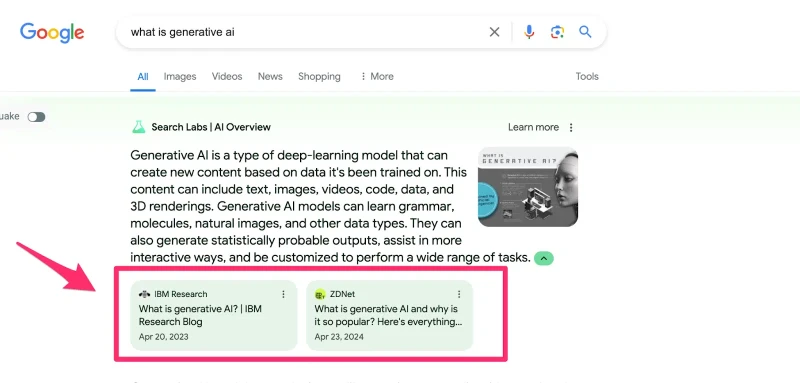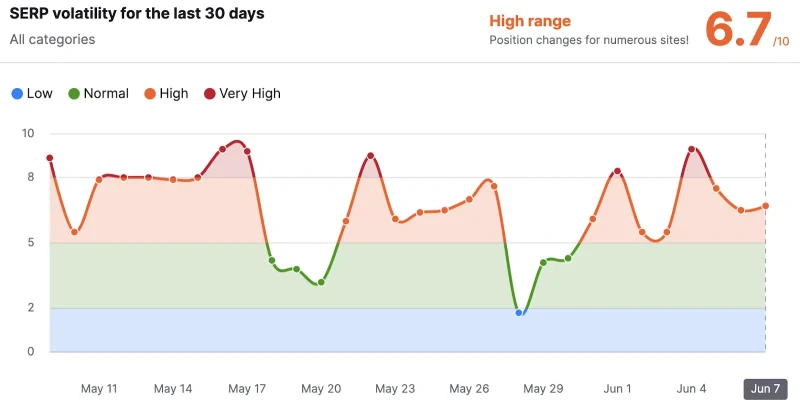How will generative AI impact website rankings and traffic?
Let’s start by bringing you back in time.
In 1901, Wilbur Wright told his brother Orville that man would not fly for 50 years.
Two years later, in 1903, the brothers built the first airplane.
The next evolution of search is here now. But we still need to find out when it will be ready to fly.
Now, Google has announced that AI Overviews get a higher click-through rate than normal web search results.
We know that Google’s AI Overviews is appearing in 15% of queries, but previously was at 84% of all queries.
Generative AI is already impacting website rankings and traffic. And it’s here to stay.
But how is generative AI impacting website traffic?
Let’s walk through what we know today about how generative AI impacts website rankings and traffic.
It’s important to note that Google and other search engines will likely ramp up efforts to improve their AI products over time. Also, Google’s AI Overviews only show for logged-in users with Incognito turned off in Chrome, so these current impacts may need to be updated.
Organic, direct, referral and affiliate traffic will decrease
So, searches will increase, but websites will suffer and generate less organic traffic overall.
Here’s a ballpark estimate:
AI results in 6x searches per day
AI leads to a 60% decrease in average CTR
This could lead to a 30% reduction in organic traffic
Every single website is going to feel the pain.
Gilad David Maayan, CEO and Founder of Agile SEO, analyzed traffic drops for 23 websites after Google’s AI Overviews launched.
In his study, he uncovered that after Google’s AI Overviews was launched organic traffic drop was 18-64%.
With Google’s AI Overview, it’s a winner-takes-all.
This means that only a couple of link cards showing queries. This could push the little company out of the search results for a bigger brand.

These link cards may replace featured snippets, but Google has confirmed that featured snippets are not going away – yet!
It shouldn’t be a shock because Google has been testing featured snippets for the past few years.
You may have seen fluctuations in your featured snippets rankings over the past few months.
Reduced crawl budget means less content will be indexed
Google has an infrastructure challenge.
The amount of content Google has to crawl, render and index is massive and it’s growing with AI-written content.
Google’s data centers can’t handle it.
So, Google is resulting to shortcuts like reducing crawl budget for websites that have higher content velocity to their trust rating.
This means that if you have thin, unhelpful, generic content, Google likely won’t index it at all.
Think about it. Creators are asking the same question and leveraging AI-generated content in their web content, resulting in vast amounts of spam and duplicate content.
Once a search engine detects the similarity of content across all those different websites, it will categorize it as unoriginal.
Today, the best way to get your content seen by Google is through content written with experience and opinion. AI cannot write based on experience.
I use Ziptie to check for AI-written content.
CTRs targeting informational queries will continue to decrease
CTR for informational queries has been declining for years.
Unsurprisingly, this trend has continued, but the speed of decline has been unlike anything I’ve seen before.
Here’s an example of the massive decline in informational queries.

This website saw a 71% decrease in informational query ranking from December 2023 to April 2024.
The impacted pages were listicles, category pages, glossaries and top-of-funnel education-style content.
I’m targeting more transactional and navigational content, with Google cannibalizing top-of-funnel queries.
Searches will increase and so will ranking volatility
Remember in 2016 when Google announced its mobile-first indexing?
It caused an uproar in the SEO community, with people speculating that searches will decrease and people will no longer use computers.
In the real world, mobile searches have increased.
It’s a similar situation with AI.
Behavior changes over time. As people learn and adapt to AI, the way people search will change.
The rise of AI will cause searches to increase. And when searches increase, ranking volatility heightens.

The top 10 organic search results don’t matter anymore
Google has also experimented with changing the space the AI Overviews take up in the search results, making it bigger and smaller.
I’ve seen the number one ranking position pushed down by 640 pixels, but it’s been ranging from 200 to 2,000 pixels depending on Google’s experiments.

More ad inventory means lower CPC
Searchers will find Google Ads above the Google AI Overview, resulting in an uptick in Google’s revenue.
We saw Google’s ad revenue decline nearly 4%. Ad revenue is Google’s main moneymaker. It’s not a shock that Google’s AI Overviews will aim to benefit ad revenue.
This could result in lower CPC over time.
SEO professionals should continue to partner with their PPC counterparts to capture opportunities where you may see drops in organic traffic.
Prepare your sales team for better quality leads but likely less volume of leads
While the traffic flow to your website may reduce, you will start to see higher-quality search traffic. As Google notes, “Let Google do the searching for you.”
This means that Google will ask more questions to help provide the best possible search result for that query.
Google’s AI Overviews aim to improve search and make it easy for users to find what they want.
It may take longer for a user to find your website, but if your content is relevant and helpful, the searcher who lands on your website will likely be a higher-quality lead.
People will stay on Google more and explore other ways of searching
With the rise of ChatGPT, Perplexity and Bing, we will see a shift in growth in other ways people search.
Google’s AI Overviews have also introduced a new way of searching. And it’s accelerating.
The paradigm shift means people will stay on Google more or explore other search engines.
Be sure you’ve set up cross-network tracking pixels to gather more holistic data sets. And focus on building content clusters to target more in-depth spinoff questions.
Product review sites are at risk
Product reviews were hit hard by Google’s AI Overviews.
Google generates human-like product recommendations, keeping searchers in Google.
Once it generates the product recommendation, Google will send users directly to the store, where they can make direct purchases.
This means product review sites will see a massive loss in affiliate link traffic.
If you’re a product review site, it’s time to evaluate your strategy. I don’t see this going away anytime soon.
The goal of AI Overviews is to improve the searcher’s experience. Product review sites act as the middle person before getting to the product.
Intent labels need to match intent queries to improve content personalization
By labeling the intent of your search queries into buckets of datasets (i.e., “solutions,” “blogs,” etc.), you can start to train AI to recognize patterns of search queries related to your datasets.
This is learned intent.
Utilizing AI’s learned intent capabilities helps personalize content to users’ needs, creating a more engaging conversation.
Generative AI is affecting your website traffic, for better or worse
Your website traffic and rankings are likely shaken up by the rise of AI. There are poorer search results, ranking volatility and education is sparse.
The sad reality is generative AI is here to stay.
You need to think critically to win. It’s no longer about following “best practices.” Keep experimenting, testing and pushing the boundaries to see what works.
Basic information is now seen as a commodity.
Ask yourself: How will you evolve?